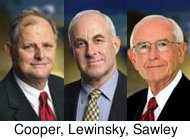10/16/2009
Shareholders Battle for Control of RedflexThree companies that own nearly a third of Redflex attempt to oust company leadership. Failed Arizona program, low stock price cited.

The number one operator of photo enforcement in the US, Redflex Traffic Systems, engaged in a public battle of words with its three largest shareholders this week. Thorney Holdings Ltd, Hunter Hall and Renaissance joined to force a shareholder vote to remove Redflex Chairman Chris Cooper and Directors Peter Lewinsky and Roger Sawley. The renegade investors, who hold 28 percent of the company stock, are upset with the mismanagement exemplified in the Redflex stock price and the "expensive failure" of the Arizona freeway photo radar contract.
"We are concerned whether the present board is appropriately qualified, experienced and competent to manage Redflex's affairs," Thorney Holdings stated in a letter to shareholders Wednesday. "Due to what we perceive to be a lack of transparency in Redflex's process for director appointments, we are concerned about the absence of information on these issues."
The renegade shareholders suggested that Cooper lacks the experience to run a company like Redflex. They also argued that poor internal control and oversight kept shareholders in the dark as the company's fiscal 2009 performance came in $8 million under the board's forecast.
"Renaissance is of the opinion that Redflex has not delivered on an expectation of superior shareholder returns given the growth of the traffic enforcement industry, particularly within the US," the firm wrote in a letter last month. "Ultimately the board is responsible for this underperformance and must be accountable to shareholders."
While companies listed on the Australian Securities Exchange ASX300 index increased in value by 24.1 percent this year, Redflex stock plunged 28.6 percent. Standard and Poors, in fact, removed Redflex from the ASX300 last month. Over five years, Redflex annualized returns have dropped 0.70 percent compared to the overall index performance which was grew 9.7 percent.
"We doubt the current Redflex board has the expertise to run an international technology company of the size, scope and complexity of Redflex," Hunter Hall Investment Management Ltd Director Jack Lowenstein wrote. "Hunter Hall has concluded that, so far, the 'Arizona statewide' program has been an expensive failure. We attribute responsibility for this outcome to a board that we believe is ill-equipped to handle contracts of such significance."
Redflex management fired back with angry denials of the charges levied by the institutional investors. Roger Sawley, the only American who serves with the company as a non-executive director, focused on his unique contribution.
"My commitment to the company is as strong as ever," Sawley said. "There is significant value in having a director based in the USA. At the least, the intangible confirmation is the many employees who say that it makes them feel that Australia cares while at a strategic level it helps inform investors and partners of Redflex's focus on these critical markets."
Redflex Chairman Chris Cooper also defended his position.
"As part of my service to the company, I have visited company staff and facilities in the USA on twelve occasions," Cooper wrote. "My commitment to the company is further illustrated by a substantial personal financial commitment -- I hold nearly two million shares bought on normal commercial terms."
The shareholders will vote to keep or replace the three Redflex directors on November 17. They will also vote to approve US$300,000 in salary plus A$206,208 in stock for Executive Director Karen Finley and a combined A$487,199 for CEO Graham Davie.


